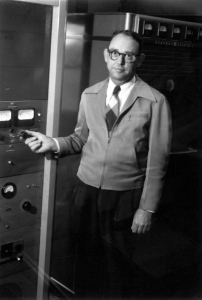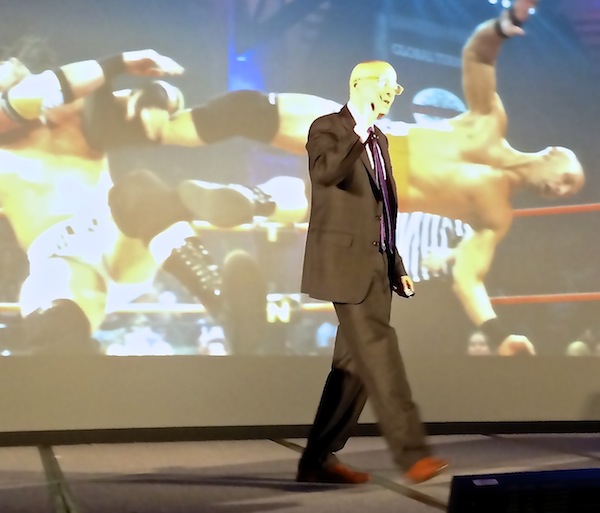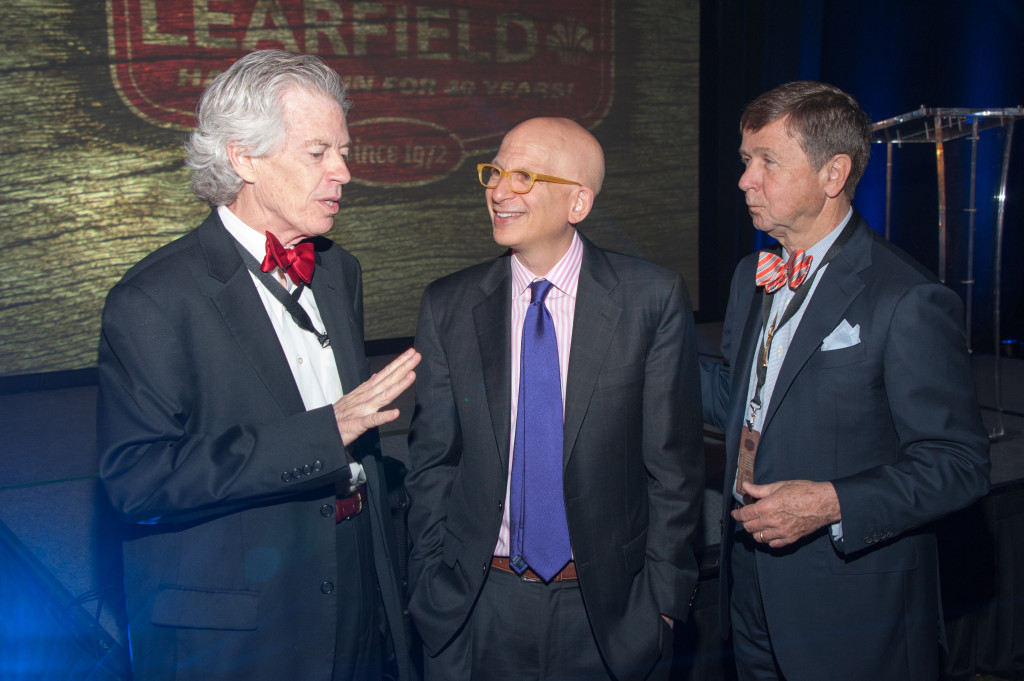 “Just as newspapers fell off a cliff, radio is about to follow. It’s going to happen faster than anyone expects. And of course, it will be replaced by a new thing, a long tail of audio that’s similar (but completely different) from what we were looking for from radio all along. And that audience is just waiting for you to create something worth listening to.”
“Just as newspapers fell off a cliff, radio is about to follow. It’s going to happen faster than anyone expects. And of course, it will be replaced by a new thing, a long tail of audio that’s similar (but completely different) from what we were looking for from radio all along. And that audience is just waiting for you to create something worth listening to.”
Tag Archives: Seth Godin
Linchpin: Are You Indispensable
By Seth Godin
“Our world is filled with factories. Factories that make widgets and insurance and Web sites, factories that make movies and take care of sick people and answer the telephone. These factories need workers.
“If you learn how to be one of these workers, if you pay attention in school, follow instructions, show up on time, and try hard, we will take care of you. You won’t have to be brilliant or creative or take big risks.
“We will pay you a lot of money, give you health insurance, and offer you job security. We will cherish you, or at the very least, take care of you.”
“It was always easier for management to replace labor than it was for labor to find a new factory. Today, the means of production = a laptop computer with Internet connectivity. Three thousand dollars buy a work an entire factory.”
“If you want a job where it’s okay to follow the rules, don’t be surprised if you get a job where following the rules is all you get to do. If you want a job where the people who work for you do exactly what they’re told, don’t be surprised if your boss expects precisely the same thing from you.
“We’ve bought into a model that taught us to embrace the system, to spend for pleasure, and to separate ourselves from our work.”
“It was always easier for management to replace labor than it was for labor to find a new factory. Today, the means of production = a laptop computer with Internet connectivity. Three thousand dollars buys a work an entire factory. pg 24
“If you want a job where the people who work for you do exactly what they’re told, don’t be surprised if your boss expects precisely the same thing from you. pg 29
“We’ve bought into a model that taught us to embrace the system, to spend for pleasure, and to separate ourselves from our work. pg 39
“A factory is “an organization that has figure it out, a place where people go to do what they’re told and earn a paycheck.” pg 40
“The launch of universal (public and free) education was a profound change in the way our society works, and it was a deliberate attempt to transform our culture. And it worked. We trained millions of factory workers. pg 41
“The essential thing measured by school is whether or not you are good at school. pg 47
“The law of linchpin leverage: The More value you create in your job, the fewer clock minutes of labor you actually spend creating that value. pg 51
“Finding security in mediocrity is an exhausting process. You’re always looking over your shoulder, always trying to be a little less mediocre than the guy next to you. pg 54
“If you can’t be remarkable, perhaps you should consider doing nothing until you can. pg 70
“If you’re remarkable, amazing, or just plain spectacular, you probably shouldn’t have a resume at all. A resume gives the employer everything she needs to reject you. pg 71
“Projects are the new resumes. pg 73
“You are not your resume. You are your work. pg 74
“It’s okay to have someone you work for, someone who watches over you, someone who pays you. But the moment you treat that person like a boss, like someone in charge of your movements and your output, you are a cog, not an artist. pg 95
“The future of your organization depends on motivated human beings selflessly contributing unasked-for gifts of emotional labor. And worse yet, the harder you work to quantify and manipulate this process,the more poorly it will work. The easier it is to quantify, the less it’s worth. pg 96
The Job Versus Your Art
“The job is what you do when you are told what to do. The job is showing up at the factory, following instructions, meeting spec, and being managed. Someone can always do your job a little better or faster or cheaper than you can. The job might be difficult, it might require skill, but it’s a job.
“Your art is what you do when no one can tell you exactly how to do it. Your art is the act of taking personal responsibility, challenging the status quo, and changing people. I call the process of doing your art “the work.” It’s possible to have a job and do the work, too. In fact that’s how you become a linchpin. The job is not the work. pg 97
“Most believe that what they do is so intrinsically good and that they should be compensated to do it even if it doesn’t produce revenue.” — Media economist Robert Picard pg 120
“Our economy has reached a logical conclusion. The race to make average stuff for average people in huge quantities is almost over. Improvements in price are now so small they’re hardly worth making. pg 123
It’s not an accident that successful people read more books. pg 126
There are plenty of bosses who fear the idea of indispensable employees and would instead encourage you to focus on teamwork. “Teamwork” is the word bosses and coaches and teachers use when they actually mean, “Do what I say.” pg 153
For the last five hundred years, the best way to succeed has been to treat everyone as a stranger you could do business with. pg 157
If you are working only for the person you report to according to the org chart, you may be sacrificing your future. pg 193
People aren’t going to follow you because you order them to. Linchpins don’t need authority. It’s not part of the deal. Authority matters only in the factory, not in your world. pg 201
For many of us, the happiest future is one that’s precisely like the past, except a little better. pg 203
Seth Godin on Blogging, Radio and Stuff

The company I worked for for 29 years, Learfield, brought four or five hundred employees and friends to Dallas last week to celebrate the company’s 40th anniversary. We had two speakers: Ken Blanchard and Seth Godin. Following Mr. Godin’s excellent talk, he took questions.
How important is your blog?
“There’s two kinds of important. There’s the important of ‘can I make a living doing this,’ and the important of ‘this is who I am.’ My blog has nothing to do with me making a living. I don’t run any ads on it and I don’t sell many things on it, almost nothing, and that’s not why I do it and why I’ve been doing it for ten years. I do it because this is my chance to speak the thing I want to say, to talk about what I notice. If I had to pay money to write my blog, I would. The people who have blogs you don’t want to read are doing that blog because it’s their job. So I spend more time on my blog than almost anything I do because it’s my chance to do my art, as I see my art. […] The people who say ‘how am I going to get paid for this tomorrow?’ never make good stuff.”
“My blog is read by more people than all but ten magazines in the United States. And I write the whole thing by myself, every day. I don’t expect to stop blogging any time in the next 40 years.”
What do you see as the future of radio?
“Radio means two things. Radio means audio delivered to masses of people who want to hear it, and it means FCC coveted spectrum. Spectrum is over. For sure. We’re only two years away from cars having radio in them that has wifi. Once that happens, my radio, in my car isn’t going to have ten channels or a hundred channels, it’s going to have ten thousand channels, a hundred thousand channels. When there’s a hundred thousand radio stations to choose from, I’m not going to pick the local jock who’s yelling at me because he needsw his Arbitron ratings to go up a tenth of a point, I’m going to pick someone who cares. Radio connects us if it chooses to.”
And here are some of my notes from Mr. Godin’s remarks: Continue reading
Me with two really smart guys
Pepper Bullock calls himself a “Change-Agent.” He has been advising senior management at Learfield (where I once worked) for years and I’ve gotten to know him a little. A really smart guy who happens to be really nice. That’s him on the right.
I was a little shy about getting my photo made with Seth Godin so Pepper dragged me up for this photo. (Thanks to Alan Blake for sending this along so promptly. He was one of the photographers at this event. A really nice guy, in addition to be a very good photographer.)
Seth Godin
I first heard Seth Godin speak at a Radio Ink conference in 2000 in Boston. He published Permission Marketing the year before and it was changing the way everybody thought about marketing.
That presentation was the best I had ever seen and I didn’t see a better one in the ensuing 13 years.
Mr. Godin was one of the speakers at an event held by the company from which I recently retired. I had a great seat down front and center and he did not dissapoint. Not sure how long he spoke but it seemed like 15 minutes (probably and hour+ in real time).
If I can get my hands on the audio or video I will take some notes and share them here. Sorry I can’t show you the video because watching how Godin used slides to help him tell his story was a thing of beauty.
Seth Godin on Zero Unemployment
I know it’s sappy, but Seth Godin can give me goose bumps. Excerpts from recent post:
In a marketplace that’s open to just about anyone, the only people we hear are the people we choose to hear. […] The more valuable someone’s attention is, the harder it is to earn.
Management is almost diametrically opposed to leadership. Management is about generating yesterday’s results, but a little faster or a little more cheaply.
For a long time to come the masses will still clamor for cheap and obvious and reliable. But the people you seek to lead, the people who are helping to define the next thing and the interesting frontier, these people want your humanity, not your discounts.
Why we care about football
“Going forward, no other sport will ever have a run like this, because the TV-cash part of the connection can’t be recreated. Mass TV built many elements of our culture, but mass TV (except for tonight) is basically over. The new media giants of our age (Facebook, Twitter, Google, etc.) don’t point everyone to one bit of content, don’t trade in mass. Instead, they splinter, connecting many to many, not many to one.” — Seth Godin explains »
Seth Godin on social networking
We Are Weird
“Ten minutes on Boing Boing reminds me that the world is changing, moving, and getting weirder. It eggs me on. Ten minutes on ESPN puts me to sleep.”
“If I can tell you that some group is wrong — not just different, but wrong — then I increase my power over you.”
“As choice and self-determination continue to triumph, you can’t profit from it by pretending you’re not a mass marketer. You actually have to stop being a mass marketer.”
“We watch the Super Bowl, no so much for the game as to remind us what it was like when we all did what everyone else was doing.”
“The reality of digital community is that people are now available for close inspection, and the ‘Net allows us to keep all of them in focus at once.”
From We Are Weird by Seth Godin
Seth on “The future of the library”
I wasn’t one of those kids that spent lots of time in the library. I loved to read but hated searching for books. Yes, I was lazy. But the coffee shop reference in this post (excerpt below) by Seth Godin gave me a nice warm glow. Most Saturday mornings, a few of us get together at the Coffee Zone and trade info bits.
“The next library is a place where people come together to do co-working and coordinate and invent projects worth working on together. Aided by a librarian who understands the Mesh, a librarian who can bring domain knowledge and people knowledge and access to information to bear.
The next library is filled with so many web terminals there’s always at least one empty. And the people who run this library don’t view the combination of access to data and connections to peers as a sidelight–it’s the entire point.
Wouldn’t you want to live and work and pay taxes in a town that had a library like that? The vibe of the best Brooklyn coffee shop combined with a passionate raconteur of information? There are one thousands things that could be done in a place like this, all built around one mission: take the world of data, combine it with the people in this community and create value.”


